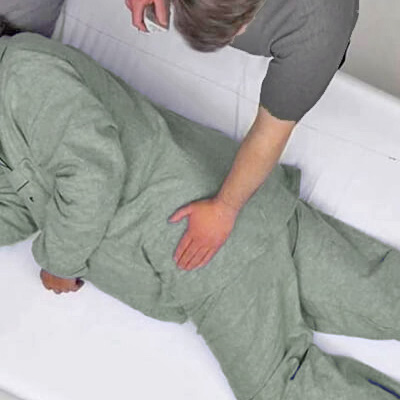
Call for more information and costs or if you are enquiring for yourself or a family member you can use our online cost guide for individuals.
Professional guides
The role of Occupational Therapy in Hand Trauma

Hand therapy is crucial for restoring function and improving quality of life for individuals recovering from hand injuries, as it addresses both the physical limitations and psychological impacts of trauma.
Addressing Handwriting Challenges in School-Aged Children

Occupational therapists are well-trained for analysing contributing factors impacting handwriting development and creating bespoke interventions and support plans for a child when required. In this article we look at the challenges and explore some of the solutions.
When is Occupational Therapy Right for Vocational Rehabilitation

In this article we explain why Occupational therapy is essential in vocational rehabilitation as it addresses the physical, mental, and environmental barriers that impact an individual's ability to return to work or retain meaningful employment.
A professional's guide to EHCPs for children with complex needs

The EHCP is an important component of a child's rehabilitation plan. In this article our aim is to provide contextual guidance to case managers and other supporting professionals on the purpose and application of EHCPs for children with complex needs.
The benefits of bed turning systems for clients with complex physical needs

When an occupational therapist recommends a bed turning system there are many considerations. In this article Monica Iofciu explores some of the common bed turning systems, their benefits, their contraindications and the risks associated with their use.
Summer feature: Our top holiday tips for clients with additional needs

Holidays can be a logistical challenge. Read our guide on our top holiday tips for wheelchair users or those with additional needs. We've included considerations for travelling abroad as well as some UK based travel ideas.
Advances in Neurological OT

The last decade has seen some exciting advances in neurological occupational therapy practice. Focusing on two approaches to upper-limb rehabilitation, find out more about Mirror Therapy and Constraint-Induced Movement Therapy and the significant benefits to clients.
Achievable Fatigue Management Techniques

Fatigue is something that is part of most of our client’s rehabilitation journeys. OT's work with clients to break down tasks & build strategic rehabilitation programmes whilst managing the need for rest & recuperation allowing clients to realise their goals & stretch their capabilities.
Mental and Physical Health: Why they go hand in hand.

Four million people develop mental health problems after a long term physical disability. A holistic approach encompassing both physical & mental health is an essential ingredient in client led rehabilitation. This article explores their important relationship & the impact on therapeutic success.
A Professional’s Guide to Sensory Impairment

This is the first article in our new series of CPD insights. Read this professional's guide on sensory impairment to learn more about the functional impacts and strategies to avoid clients becoming invisible.
How and when to source a children’s Occupational Therapist

Paediatric occupational therapy is a specialism of the profession where the OT is able to assess and treat the physical, mental and cognitive aspects of a child’s development. They look at the whole child to facilitate and support them and their family to achieve maximum independence and access the opportunities within the world around them.
A professional’s guide to paediatric spinal injury

An OT can support a child that has experienced a spinal injury in all stages of their rehabilitation journey. This guide gives an overview of how Occupational Therapists can provide holistic assessments, treatments and advice to maximise independence and quality of life.
A professional’s guide to static seating

This guide aims to provide insight into why and when a seating assessment should be commissioned. Additionally it provides information on how correct seating can be used within rehabilitation and the key factors considered within an assessment.
A professional’s guide to training

This guide has been written for professionals commissioning training services from one of our OT’s. The author, Louise, explains the different styles of training that occupational therapists can offer and how we tailor each programme to meet the client’s individual circumstances.
A professional’s guide to functional rehabilitation

What is Functional Rehabilitation? In this guide, Rachael explains how a functional OT assessment, learning about a client's personal goals, and a realistic treatment plan, can help a client achieve their optimum level of participation in daily activities.
A professional’s guide to neurological occupational therapy services

This guide has been put together to assist Case Managers understand the services an occupational therapist with a neurology specialism can offer a person with neurological impairments.
FAQs for Case managers - Neurological rehabilitation
A selection of the most commonly asked questions by Case Managers about Occupational Therapy Neurological rehabilitation.
A Professional’s Guide to Moving & Handling

This Case Manager guide explores moving & handling assessments, the impacts of poor techniques and what to expect from a risk assessment and handling management plan.
FAQs for Case Managers - Moving & Handling
A selection of the most commonly asked questions by Case Managers about Occupational Therapy Moving & Handling.
Case Manager's Lunch & Learn Sessions Launched

Case Managers and their colleagues who would like to learn more about Occupational Therapy, can now book a lunch and learn session with The OT Practice.
A professional’s guide to Vocational Rehabilitation

In this professionals guide Anthony Yuill explains the fundamental principles that underpin vocational rehabilitation intervention. He explores potential solutions to ensure that clients can remain at, or return to, meaningful employment following a progressive diagnosis or traumatic injury.
A professional’s guide to Housing

In our professionals guide to Housing, Caroline Pomeroy provides her expertise and experience of adapting existing properties to ensure they meet clients and their families current and long term housing needs as well as advice on what to look for if sourcing a property to adapt.
A case manager's guide to occupational therapy

What can OT help with? What qualifications should they have? How do I know if the report is of a high standard? These are all questions that case managers are faced with when occupational therapy is needed by their client. Victoria has provided an expert insight using her OT and case management background into these common questions.
A professional's guide to Hand Therapy

Helen Griffiths explains when a hand therapist referral might be appropriate and the process that they would go through. Clarifying when a hand therapist can help, she explains how advancing technologies have made splint provision easier in the community.
A professional’s guide to assistive technology

In this article we explore the clinical governance, uses and benefits of assistive technology. A widely used term but what does it actually mean and how can it be used to benefit your clients?
